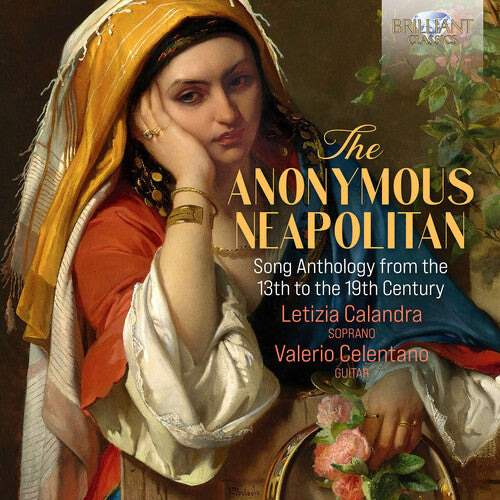Brilliant Classics
Calandra/ Celentano - Song Anthology from the 13th to the 19th Century
Calandra/ Celentano - Song Anthology from the 13th to the 19th Century
Usually ships within 1 to 2 weeks.
Couldn't load pickup availability
SKU:BRLT96820.2
Share
This album - The Anonymous Neapolitan is a continuation of Calandra's journey to Naples of old, that inexhaustible font of timeless stories, melodies and poetry. From it's earliest origins the Neapolitan canzona or song has been bound up with the life of the people of Naples and their innate desire to express their deepest feelings through song and poetry. For at least three centuries, the songs were only ever handed down orally and many of them were lost in the city's alleyways and taverns, disappearing into the very air of Naples. It wasn't until the mid-19th century that all this material was collected, transcribed and organized for the first time and Neapolitan song became fashionable among all classes of Neapolitans as well as with broad swathes of visiting tourists who also fell in love with them. For this Neapolitan anthology, Calandra and Celentano have selected 21 pieces, all by anonymous authors, including a brief instrumental insert from the very distant past, namely the Seikilos epitaph, likewise, of course, anonymous. Following the thread of feeling, Calandra and Celentano have gone back in time all the way to Ancient Greece with this musical fragment discovered in Anatolia in 1883, whose dating ranges from the 2nd century BC to the second century AD, making it the oldest complete piece of music that has found a place in their repertoire. This age-old melody has an innate, almost indescribable beauty, solidifying Calandra and Celentano's decision to feature it as an introduction to the song that's believed to be the oldest in the Neapolitan tradition, the 'Ritornello delle Lavandaie del Vomero' (Song of the Washerwomen of Vomero). To close the CD: an authentic masterpiece of the Neapolitan dialect repertoire from the 18th century, 'Lo Guarracino', whose text describes various characters with abundant invention and sophistication. Nonetheless this can only be attributed to the work of an anonymous poet, whose geniality and refinement are all we know about him or her. There is a sense of continuity between this project and Calandra's previous Naples-related albums for Brilliant Classics: Scarlatti and the Neapolitan Song, Donizetti: Nuits d'été à Pausilippe and Erotica Antiqua: Neapolitan Villanellas. But most of all it represents a sentimental journey across the centuries and through our fresh imaginings of a hugely important musical heritage that must not be lost. With this album The Anonymous Neapolitan Letizia Calandra's continues her journey into ancient Naples, an inexhaustible source of timeless stories, melodies and poems. From it's origins, Neapolitan song has been linked to the life of the Neapolitan people and their innate need to express their feelings through song and poetry. In this Naples of the time of unknown authors, for at least three centuries the songs were only handed down orally and many of them were lost in the city's alleys, taverns and air. It was only in the mid-19th century that all this material was collected, transcribed and organized for the first time and the Neapolitan song became fashionable among all the Neapolitan classes and the many foreign tourists who adored it. For this album the artists have chosen an anthology of 21 Neapolitan songs, all by anonymous authors. It starts in ancient Greece with The Epitaph of Sicilus, found in Anatolia in 1883. It dates from the 2nd century B.C. to the 2nd century A.D. and can therefore be considered the oldest complete piece of music that has come down to us. This very ancient melody retains an indescribable primal beauty. The oldest song in the Neapolitan repertoire is the Canto delle lavandaie del Vomero, whose origins date back to the 12th or 13th century. On this mysterious song, there is an exceptional testimony: it seems that the song was heard by Giovanni Boccaccio, who spent his entire adolescence in Naples (between 1327 and 1340), and who mentions it in one of his letters, impressed by it's beauty. Closing the CD is an authentic masterpiece of 18th-century Neapolitan dialect literature, Lo Guarracino, written by an evidently brilliant and refined local poet, however sadly anonymous. Letizia Calandra is widely acclaimed for the great versatility of her voice. Classically schooled and specialized in Early Music she uses her beautiful voice in an original way, which suits the popular nature of the music well. She is a foremost interpreter of classical Neapolitan Song, a perfect blend of the high and the low. On this CD she is accompanied by Valerio Celentano on guitar.



